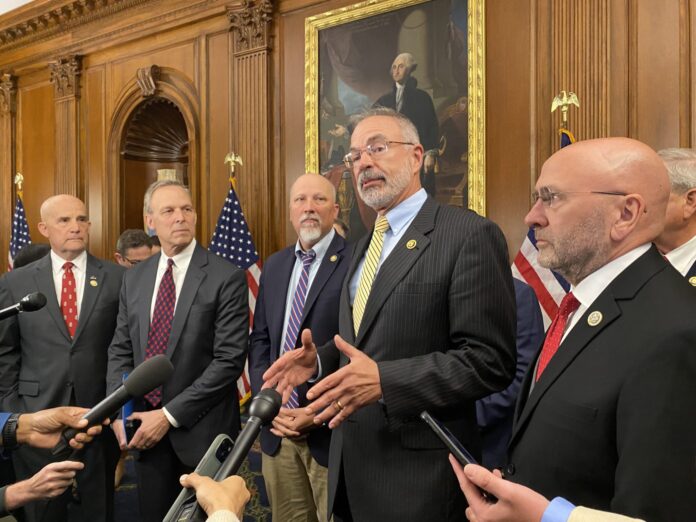
WASHINGTON (States Newsroom) — U.S. House Republican leaders released changes to their “one big beautiful bill” late Wednesday after marathon negotiations with conservatives demanding deeper cuts to safety net programs, teeing up debate and a final vote likely sometime Thursday.
The alterations, which will have to be adopted later, moved up implementation of work requirements for Medicaid by at least a couple of years and tossed out plans to sell some public lands. The new language also tightened the timeline for clean energy tax breaks and raised the ceiling for taxpayers who deduct state and local taxes.
The package of adjustments — the manager’s amendment — was incorporated into the larger reconciliation bill, which was approved by the House Rules Committee just before 11 p.m. Eastern on an 8-4 party-line vote. Far-right holdout Rep. Chip Roy of Texas was absent.
Next, the package must pass a procedural vote on the House floor before lawmakers can debate and take a final vote.
With a razor-thin margin, House Speaker Mike Johnson can only lose a handful of members on each vote. Democrats are expected to uniformly vote “no” in the procedural and final votes.
Medicaid
Republicans moved up implementation of work requirements for Medicaid enrollees from taking effect after January 1, 2029 to no later than December 31, 2026. That could mean some states will make the changes before next year’s midterm elections.
The provision would require those who rely on the state-federal health program for lower-income Americans and some people with disabilities, who are between the ages of 19 and 65, to work, participate in community service, or attend an educational program at least 80 hours a month.
The language has numerous exceptions, including for pregnant people, parents of dependent children, people who have complex medical conditions, tribal community members, people in the foster system, people who were in the foster system who are below the age of 26 and people released from incarceration in the last 90 days, among others.
The GOP changes also would bar Medicaid from covering gender transition procedures for anyone in the program. The bill previously barred that type of treatment for anyone below the age of 18.
Clean energy tax credits
Republicans also tightened the timeline on the termination of clean energy tax credits enacted under President Joe Biden. Hardliners focused on reducing the deficit had demanded a quicker phase-out for the credits.
The new language would accelerate phase-outs for clean energy investment tax credits to 2028, up from 2031, with special carve-outs for nuclear facilities. Companies that break ground on new facilities 60 days after the bill is enacted, if passed, will not qualify for the tax credits. The same applies to any facility placed into service after 2028.
State and local taxes
A separate contingent of Republican holdouts reached a deal with Johnson to raise the SALT cap to $40,000, up from the $10,000 lid enacted under the 2017 tax law. The SALT cap — the amount of state and local taxes constituents can deduct from federal taxable income — is a top issue for Republicans who represent districts in high-tax blue states, including California, New Jersey and New York.
The amount of SALT taxpayers can deduct decreases for those making more than $500,000 annually. The SALT cap and the income cut-off will increase by 1% each year from 2027 until 2033.
Public lands sale
The amendment removed language that would have allowed the sale of public lands in Nevada and Utah.
The National Wildlife Federation credited Montana Republican Rep. Ryan Zinke with removing the provision.
“Thank you to Rep. Ryan Zinke and his colleagues who listened to their constituents and worked with House leaders to eliminate the provision from the budget reconciliation bill,” NWF Associate Vice President for Public Lands David Wilms said in a statement. “We urge all members of Congress to refrain from similar attacks on America’s public lands.”
Jessica Turner, president of the Outdoor Recreation Roundtable, wrote in a statement that “Congress avoided setting a dangerous precedent that lands can be sold anytime the U.S. Treasury needs a budget ‘pay-for’ and threatening outdoor recreation businesses and rural communities alike that need certainty, access, and long-term infrastructure.”
The Center for Biological Diversity’s Great Basin Director Patrick Donnelly wrote in a separate statement that it was “appalling that GOP leaders tried to get away with auctioning off some of our country’s most beautiful landscapes to fund tax cuts for billionaires and make developers richer. This is Gilded Age-level stuff, and I hope people remember it the next time Republicans try to pretend they care about public lands.”
A separate provision in the amendment appeared to narrow the federal authorizations energy projects could bypass by paying a $10 million fee. The section had been attacked by environmental groups as a “pay-to-play” for energy companies.
White House meeting
The changes come after Johnson, a Louisiana Republican, and far-right holdouts huddled with President Donald Trump at the White House Wednesday afternoon.
Johnson, speaking to reporters at the Capitol following the meeting, said that lawmakers had “a good discussion” and that he believes the GOP is “in a very good place.”
“I think that all of our colleagues here will really like this final product, and I think we’re going to move forward,” Johnson said.
Johnson said members of the Freedom Caucus, who previously argued the legislation doesn’t go far enough to restructure Medicaid and reduce federal spending, may end up supporting the bill, in part because Trump plans to address their other concerns through unilateral actions.
“You will see how all this is resolved. But I think we can resolve their concerns and it’ll be probably some combination of work by the president in these areas as well as here in Congress,” Johnson said. “So there may be executive orders related to some of these issues in the near future.
“And, you know, this is a commitment the president has made. He wants to go after fraud, waste and abuse.”
White House press secretary Karoline Leavitt released a written statement saying the “meeting was productive and moved the ball in the right direction.
“The President reiterated how critical it is for the country to pass the One Big Beautiful Bill as quickly as possible.”
Complex process
Republicans are using the complex reconciliation process to move the package through Congress with simple majority votes in each chamber, avoiding the Senate’s 60-vote legislative filibuster, which would otherwise require bipartisanship.
Reconciliation measures must address federal revenue, spending, or the debt limit in a way not deemed “merely incidental” by the Senate parliamentarian. That means the GOP proposals must carry some sort of price tag and cannot focus simply on changing federal policy.
Republicans are using the package to extend the 2017 tax law, increase spending on border security and defense by hundreds of billions of dollars, overhaul American energy production, restructure higher education aid and cut spending on Medicaid.
A new Congressional Budget Office analysis released late Tuesday projected the massive reconciliation package would decrease resources for low-income families over the next decade while increasing resources for top earners.
Freedom Caucus
Earlier Wednesday, members of the Freedom Caucus told reporters following a different meeting with Johnson that they believed negotiations were moving in the right direction, but were skeptical of trying to approve the entire package this week.
Maryland Republican Rep. Andy Harris, chairman of the group, said they wanted the legislation to go further in terms of addressing “waste, fraud and abuse” within Medicaid, though he declined to elaborate.
The Medicaid proposals in the version of the bill prior to the negotiated changes would cut $625 billion in federal spending during the next decade, under a CBO analysis. Democrats have warned the result would be millions of vulnerable people losing access to the health program for lower income people and some people with disabilities.
Texas Republican Rep. Chip Roy said during that same impromptu press conference that leadership and members of the Freedom Caucus had made “significant progress” toward a final agreement.
“We’re trying to deliver so that the people who are actually out there working hard can actually get the health care that they want to get, that they can get, and get it the best way possible,” Roy said. “That’s what this is all about; changing a broken system, making sure we’re saving taxpayer dollars and being able to provide a better environment for people to be able to thrive.”
Pennsylvania Republican Rep. Scott Perry, who used to chair the Freedom Caucus, said that holding a House vote before Memorial Day was a made-up timeline and that if negotiations needed to last longer, they should.
“This is a completely arbitrary deadline set by people here to force people into a corner to make bad decisions,” Perry said. “It’s more important to get this right, to get it correct, than to get it fast. We are sitting at the table to do that.”
Jacob Fischler contributed to this report.






